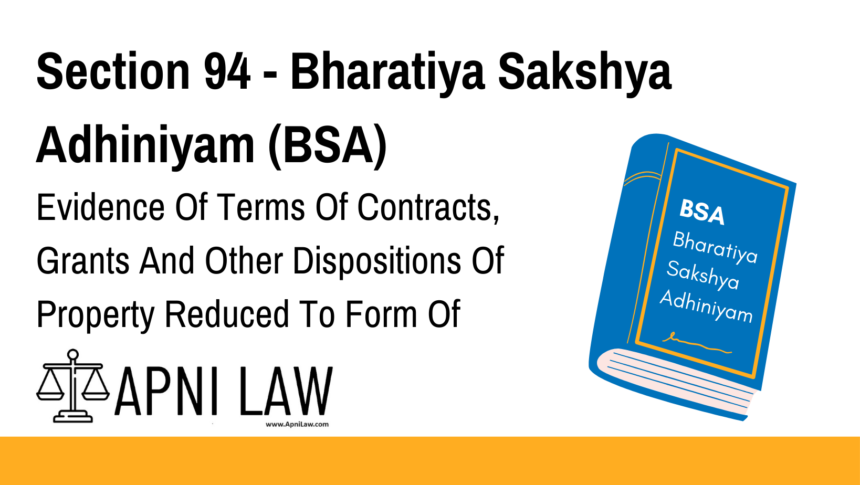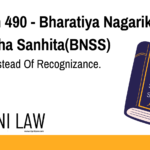Code: Section 94 – Bharatiya Sakshya Adhiniyam, 2023
When the terms of a contract, or of a grant, or of any other disposition of property,
have been reduced to the form of a document, and in all cases in which any matter is
required by law to be reduced to the form of a document, no evidence shall be given in proof
of the terms of such contract, grant or other disposition of property, or of such matter,
except the document itself, or secondary evidence of its contents in cases in which secondary
evidence is admissible under the provisions hereinbefore contained.
Exception 1.—When a public officer is required by law to be appointed in writing,
and when it is shown that any particular person has acted as such officer, the writing by
which he is appointed need not be proved.
Exception 2.—Wills admitted to probate in India may be proved by the probate.
Explanation 1.—This section applies equally to cases in which the contracts, grants
or dispositions of property referred to are contained in one document, and to cases in which
they are contained in more documents than one.
Explanation 2.—Where there are more originals than one, one original only need be
proved.
Explanation 3.—The statement, in any document whatever, of a fact other than the
facts referred to in this section, shall not preclude the admission of oral evidence as to the
same fact.
Illustrations.
(a) If a contract be contained in several letters, all the letters in which it is contained
must be proved.
(b) If a contract is contained in a bill of exchange, the bill of exchange must be
proved.
(c) If a bill of exchange is drawn in a set of three, one only need be proved.
(d) A contracts, in writing, with B, for the delivery of indigo upon certain terms. The
contract mentions the fact that B had paid A the price of other indigo contracted for verbally
on another occasion. Oral evidence is offered that no payment was made for the other
indigo. The evidence is admissible.
(e) A gives B a receipt for money paid by B. Oral evidence is offered of the payment.
The evidence is admissible.
Explanation of Section 94 BSA
Section 94 of the Bharatiya Sakshya Adhiniyam (BSA) sets out the rule that when the terms of a contract, grant, or property disposition are written in a document, only the document itself (or admissible secondary evidence) can be used to prove those terms in court.
This is known as the “best evidence rule” — prioritizing documentary evidence over oral testimony when a document exists to express the terms.
Key Principles:
-
If a legal act (e.g., contract, property grant) is documented in writing, its contents must be proven through the document itself.
-
Oral evidence cannot be substituted for the written terms unless secondary evidence is permissible.
-
This rule applies regardless of whether the terms are contained in one or multiple documents.
Exceptions:
-
A person shown to act as a public officer need not prove the appointment letter.
-
Wills admitted to probate can be proved by the probate alone.
Explanations:
-
Applies equally to single or multiple documents.
-
If multiple originals exist, proving one is enough.
-
Oral evidence about unrelated facts in the document can still be admitted.
Illustration
Example 1: Contract in Multiple Letters
If a contract is formed through a series of letters exchanged between two parties, all of those letters must be produced in court to prove the contract.
Example 2: Bill of Exchange
If a contract exists in the form of a bill of exchange, the document itself must be submitted as evidence, not merely a verbal account of its contents.
Example 3: Reference to Previous Deal
A written contract refers to another transaction that happened verbally on a different date. Oral evidence can be admitted to question the truth of that unrelated fact, even though it is mentioned in the document.
Example 4: Receipt of Payment
A written receipt exists for a payment. Oral evidence can still be admitted to prove that the payment was actually made.
Common Questions and Answers on Section 94 BSA
1. What is the main objective of Section 94 BSA?
The main goal is to uphold the integrity of documentary evidence by preventing oral evidence from altering or contradicting written terms.
2. Are there exceptions to this rule?
Yes, public officer appointments and wills admitted to probate can be proved without producing the written document itself.
3. Can oral evidence ever be used alongside written contracts?
Yes, oral evidence can be admitted for facts mentioned in the document that do not relate to the terms of the contract or grant itself.
4. Why does the law require the document itself to be presented?
To prevent fraud and ensure accuracy — documentary evidence is considered more reliable than oral testimony in legal proceedings.
5. What happens if the original document is lost?
Secondary evidence of its contents may be admissible under the rules provided in earlier sections of the BSA.
Conclusion
Section 94 of the Bharatiya Sakshya Adhiniyam emphasizes the importance of relying on documentary evidence when the terms of legal agreements or property transactions are written. By excluding oral evidence in such cases, the law ensures clarity, precision, and fairness in judicial proceedings. Understanding this section is crucial for anyone dealing with contracts, deeds, and formal property transactions in India.
Explore more legal insights on the Bharatiya Sakshya Adhiniyam at ApniLaw













